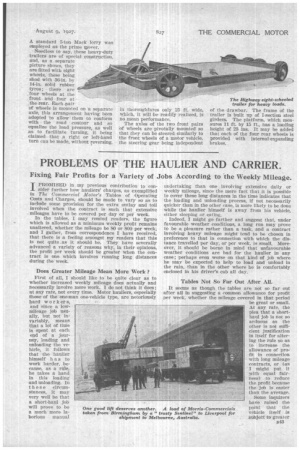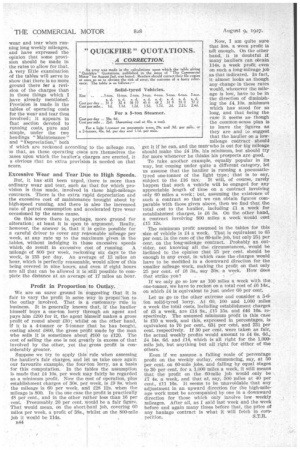PROBLEMS OF THE HAULIER AND CARRIER.
Page 61

Page 62

If you've noticed an error in this article please click here to report it so we can fix it.
Fixing Fair Profits for a Variety of Jobs According to the Weekly Mileage.
T PROMISED in my previous contribution to con
sider further how hauliers' charges, as exemplified in The Commercial Motor's Tables of Operating Costs and Charges, should be made to vary so as to include some provision for the extra outlay and toil involved when the contract is such that extensive • mileages have to be covered per day or per week. In the tables, I may remind readers, the figure which is allowed as a minimum weekly profit remains unaltered, whether the mileage be 80 or 800 per week, and I gather, from correspondence I have received, that there is a feeling amongst my readers that this is not quite as it should be. They have severally advanced a variety of reasons why, in their opinions, the profit per week should be greater when the contract is one which involves running ling distances during the'week.
Does Greater Mileage Mean More Work ?
First of all, I should like to be quite clear as to whether increased weekly mileage does actually and necessarily involve more work. I do not think it does; at any rate, not every time. Motor hauliers, especially those of the one-man one-vehicle type, are notoriously hard workers,
and since a lowmileage job usually, but not invariably, means that a lot of time is spent at each end of a journey, loading and unloading the vehicle, it follows that the haulier himself has to work harder, because, as a rule, he takes a hand in this loading and unloading. In th a s e circumstances, it may very -well be that a short-haul job will prove to be a much more laborious manual
undertaking than one inVolving extensive daily or weekly mileage, since the mere fact that it is possible to cover these long distances in the time indicates that the loading and unloading process, if not necessarily quicker than in the other case, is more likely to be done while the haulier himself is away from his vehicle, either sleeping or eating.
Indeed, I might go farther and suggest that, under favourable weather conditions, a long run may prove to be a pleasure rather than a task, and a contract involving heavy mileage might tend to be chosen in preference to that in connection with which the distance travelled per day, or per week, is small. Moreover, it should be borne in mind that unfavourable weather conditions are bad for the haulier in any case; perhaps even worse on that kind of job where he may be expected to help to load and unload in the rain, than in the other where he is comfortably enclosed in his driver's cab all day.
Tables Not So Far Out After All.
It seems as though the tables are not so far out after all in suggesting a common allowance for profit per week, whether the mileage covered in that period be great or small.
At any rate, the plea that a shorthaul job is not so arduous as the other is not sufficient justification in itself for altering the rule so as to increase the allowance of profit in connection with long mileage contracts, or (as • I might put it with equal fairness) to reduce the profit because the job is easier than the average. Some inquirers have raised the point that the vehicle itself is Subjeet to greater B43 wear and tear when running long weekly mileages, and have expressed the opinion that some provision shotild be made in the rates to allow for that. A very little examination of the tables will serve to show that there is no more ground there for a revision of the charges than in those things which I have already mentioned. Provision is made in the tables of operating costs for the wear and tear thus involved ; it appears in that section devoted to running costs, pure and simple, under the two headings "Maintenance" and "Depreciation," both
if which are reckoned according to the mileage run, io that, as these operating costs are themselves the aases uPon which the haulier's charges are erected, it s obvious that no extra provision is needed on that score.
Excessive Wear and Tear Due to High Speeds.
But, it has still been urged, there is more than ordinary wear and tear, such as that for which provision is thus made, involved in these high-mileage contracts. There is the extra rapid depreciation and the excessive cost of maintenance brought about by high-speed running, and there is also the increased rate of petrol consumption and accelerated tyre wear occasioned by the same cause.
On this score there is, perhaps, more ground for alteration; at least it is open to argument. Really, however, the answer is, that it is quite possible for a careful driver to cover any reasonable mileage per week, at any rate up to the maximum given in the tables, without indulging in those excessive speeds which, do result in excessive cost of running. A mileage of 800 per week, reckoning six days to the week, is 133 per day. An average of 15 miles an hour, which is perfectly reasonable, would allow of this being covered in nine hours, and even if eight hours are all that can be allowed it is still possible to complete the distance at an average of 17 miles an hour.
Profit in Proportion to Outlay..
We are on surer ground in suggesting that it is fair to vary the profit in some way in proportion to the outlay involved. That is a customaryrule in business. It is generally known that, if the haulier himself buys a one-ton lorry through an agent and pays him £200 for it, the agent himself makes a gross profit of round about £30; whilst on the other hand, if it is a 4-tanner or 5-tonner that he has bought, costing about 1800, the gross profit made by the man who sells it is sometimes about 2100 to £120. The cost of selling the one is not greatly in excess of that involved by the other, yet the gross profit is considerably greater.
Suppose we try to apply this rule when assessing the haulier's fair charges, and let us take once again our favourite example, the four-ton lorry, as a basis for this computation. In the tables the assumption is made that £4 10s. per week may fairly be regarded as a minimum profit. Now the cost of operation, plus establishment charges of 30s. per week, is £9 8s. when the mileage is 60 per week, and £28 12s. when the mileage is 800. In the one case the profit is practically 48 per cent., and in the other rather less than 16 per cent. Presumably 20 per cent. would be a fair figure. That would mean, on the short-haul job, covering 60 miles per week, a profit of 38s., whilst on the 800-mile job it would be 114s.
B44
Now, I am quite sure that Ms. a week profit is at enough. On the other hand, it is doubtful if many hauliers can obtain 114s. a week profit even on such a long-mileage job as that indicated. In fact, italmost looks as though any change in these rates would, whenever the mileage is low, have to be in the direction of diminishing the £4. 10s. minimum which has stood for so long, and that being the case it seems as though the common-sense plan is to leave the figures as they are and to suggest that the haulier on a low mileage contract should get it if he can, and the naan'who is out for big mileage should make the 14 10s. his minimum, but should try for more whenever he thinks his prospects are good.
To take another example, equally popular in its way, but coming under quite a different category, let us assume that the haulier is running a pneumatictyred one-tonner of the light type; that is to say, subject to the £16 tax. It will, of course, rarely happen that such a vehicle will be engaged for any appreciable length of time on a contract involving only 60 miles a week ; but, assuming the existence of such a contract so that we can obtain figures comparable with those given above, then we find that the total cost to the haulier, including £1. a week for establishment charges, is £6 3s. On the other hand, a contract involving 800 miles a week would cost /15 12s.
The minimum profit assumed in the tables for this size of vehicle is 14 a week. That is equivalent to 65 per cent, in the case of the 60-mile job, but only 251 per cent. on the long-mileage contract. Probably an out' sider, not knowing all the circumstances, would be inclined to the opinion that 25 per cent, should be enough in any event, in which case the charges would have to be modified in a downward direction for the smaller mileage work, making the profit on that only 25 per cent. of £6 3s., say 30s. a week. How does that strike you?
If we only go so low as 100 miles a week with the. one-tonner, we have to reckon on a total cost of 16 14s., on which £4 is equivalent to just under 60 per cent.
Let us go to the other extreme and consider a 54 ton solid-tyred lorry. At 60, 100 and 1,000 miles a week the total costs, including establishment charges of £3 a week, are £14 8s., /15 15s. and £46 16s. respectively. The assumed minimum profit in this case is £10 a week, and this, expressed in percentages, is equivalent to 70 per cent., 631 per cent. and 231 per cent. respectively. If 30 per cent. were taken as fair, the actual weekly profits would amount to £4 Gs. 6d., £4 14s. 6d. and £14, which is all right for the 1,000mile job, but anything but all right for either of the Others.
Even if we assume a falling scale of percentage profit on the weekly outlay, commencing, say, at 50 per cent. on 60-mile jobs, and falling by equal stages to 30 per cent. for a 1,000 miles a week, it still means that the profit on the 60-mile job would only be 17 4s. a week, and that at, say, 500 miles at 40 per cent., 111 16s. It seems to be unavoidable that any adjustment in an upward direction for the high-mileage work must be accompanied by one in a downward direction for those which only involve low weekly mileages. After all, as I said last week and the week before and again many times before that, the price of any haulage contract is what it will fetch in com
petition. S.T.R.




































































































